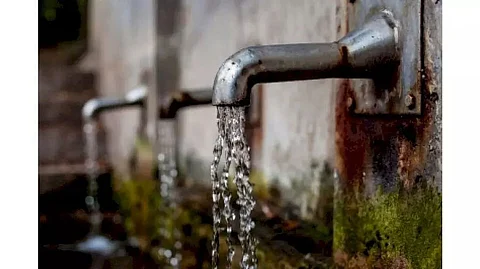Jal Jeevan Mission scripting stories of change: Centre
NEW DELHI: The Centre on Tuesday said the success of Jal Jeevan Mission (JJM) primarily lies in the hands of the women and since the core of the mission is community participation, the increasing interest and participation of women in it are signs of its imminent success.
In rural areas, women are typically the water managers at home and lack of clean drinking water provides many challenges to them, even more so when the water is contaminated with arsenic. Due to the hardship, women are more conscious of ensuring the basic need of clean and safe drinking water supply in their homes, the Ministry of Jal Shakti said and presented examples from two varied states.
Darrang district in Assam has been included in the Aspirational Districts programme of the NITI Aayog. "Darrang faces scarcity of clean drinking water in the rural areas and the quality of water is plagued with issues such as Arsenic contamination making it largely unfit for drinking directly. Adding to its woes is the perennial flood," a statement from the Jal Shakti Ministry said.
Assam's JJM motto is Ghare Ghare Bisudha Paani (clean tap water in every home) wherein Implementation Support Agencies (ISAs) have been engaged to support its execution at the grassroots level.
Dhulikona Foundation, one of the ISAs, has been engaged in 60 villages spread across nine Gram Panchayats (GPs) with seven of the nine led by females. "It is very encouraging to witness the GP presidents, primarily the female GP presidents, taking the lead," the Ministry said.
Away from Assam, is the Odisha's Madhuramba village in Gajapati district. It faced a water crisis, which would become acute in summers. Till 2018, the residents of the village struggled daily to meet their drinking water needs. Lack of water in close proximity made life difficult for them. Four handpumps in the village catered to the water requirement of all the residents but they would go dry in summers.
The JJM was launched in August 2019 when Gram Vikas, a civil society organization, already working in the area, approached the community with possible solutions to end their ordeal. A participatory meeting was organized in the village wherein people were informed about the 'Har Ghar Jal' programme. It was informed that every home in the village could get a tap water connection if they were willing to join the programme, prepare a village action plan with support from the public health engineering department officials, approve the plan in the Gram Sabha and submit the same to the district administration for consideration and implementation.
"The community requested for installing three tap connections in their homes - in the kitchen for drinking and cooking meals, in the bathroom and the third one for usage in toilets," the statement said, adding, "These three taps would not just provide 'ease of living' but also end the drudgery faced especially by women and young girls."
The Village Water & Sanitation Committee (VWSC) installed metres at every household, checks it regularly and issues bills to collect user charges to avoid wastage. The village uses solar energy to lift water to the overhead tank. The user fee collected from the household is used for regular cleaning as well as upkeep of water supply structures, chlorination of overhead tanks, procurement of Field Tests kits and maintenance as well as repair of water supply structures whenever the need arises, it added.
The community is working towards making their Panchayat into a 'Jal Prabudh Gaon,' for which they have developed a grey water management plan. IANS
Also Watch:

